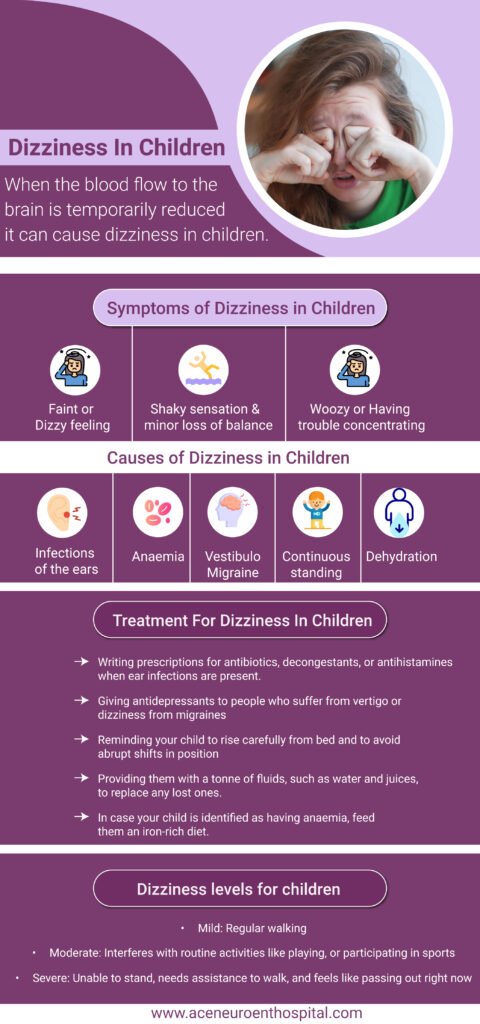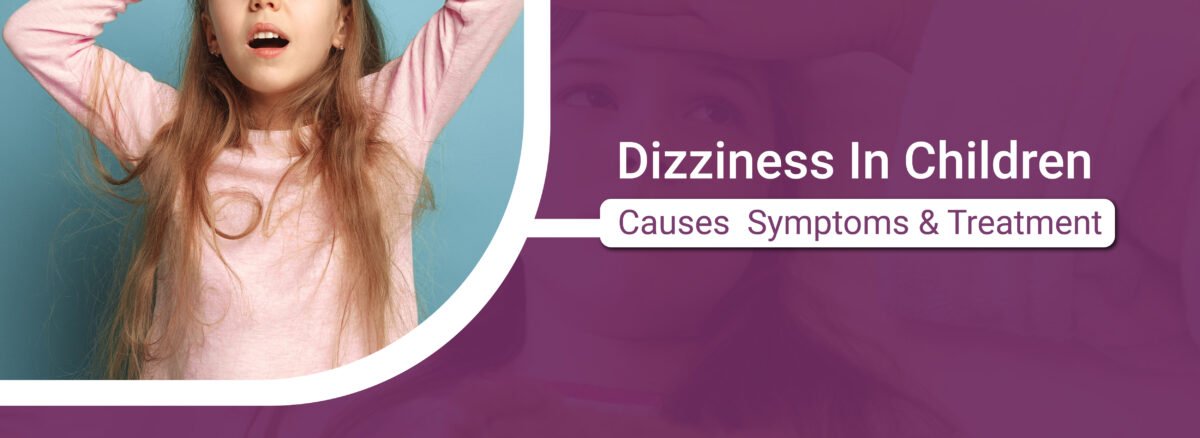When the blood flow to the brain is temporarily reduced, it can cause dizziness in children. When they are dizzy, they might explain why they feel dizzy or faint. Most of the time, dizziness is not accompanied by any overt symptoms or indicators of sickness. However, ongoing dizziness puts a child’s safety and well-being in danger. Thus, to find and address the underlying causes of your dizziness, you may seek paediatric care.

Symptoms of dizziness in children
Dizziness is usually caused by a temporary reduction in blood supply to the brain. Here are the symptoms:
- Having a faint or dizzy feeling
- Having a shaky sensation and a minor loss of balance
- Feeling “woozy” or having trouble concentrating
- There can also be short visual blurring
Causes of dizziness in children
Dizziness is frequently an indication of weakness, but it can also indicate a medical issue. Here are a few reasons why children could feel dizzy:
- Infections of the ears – Children may experience abrupt dizziness due to conditions including labyrinthitis (an issue with the inner ear) and vestibular neuritis (inflammation of the vestibular nerve in the inner ear). Extreme vertigo and a lingering ringing in the ears might be symptoms of ear illnesses. While ear infections frequently resolve on their own, a doctor may advise antibiotics if a bacterial infection is present.
- Anaemia – It is a disorder when there are insufficient healthy red blood cells in the blood, reducing the amount of oxygen getting to the organs. Dizziness, exhaustion, generalised bodily weakness, loss of appetite, pale complexion, and reduced immunity are some of the symptoms of anaemia that are frequently experienced. Get your child’s haemoglobin levels examined if they experience frequent lightheadedness.
- Vestibulo-migraine – Lack of sleep, dehydration, dietary allergies, or an inherited illness are a few potential causes. Experts speculate that the narrowing of blood vessels around the brain may be the specific cause, even though this is unknown. Other symptoms of a vestibular migraine include nausea, vomiting, light sensitivity, and loss of balance.
- Childhood cases of benign paroxysmal vertigo – Although the exact reason is unknown, it is believed that this illness serves as a warning sign for migraine in later life. It is characterized by signs including nystagmus (fluttering or irregular eye movements), dizziness, vomiting, a pale complexion, perspiration, and head tilt. Most children outgrow these symptoms as they get older and often start when they are 3 to 4 years old.
- Continuous standing – Children with a slim physique and little blood volume frequently experience dizziness from prolonged standing. Blood tends to pool in the legs when a child remains still for an extended amount of time, which slows the flow of blood to the brain. When a kid is held or kept upright, the symptoms of dizziness frequently go away in 30 to 60 seconds, and they may appear normal and unaffected.
- Orthostatic hypertension – When standing up straight, those with orthostatic hypertension experience an increase in blood pressure. According to studies, OHT may make young individuals more susceptible to developing hypertension. Dizziness, headaches, tightness in the chest, discomfort in the chest, palpitations, and syncope (fainting or passing out) are some of the typical symptoms of OHT. OHT may be brought on by abrupt postural adjustments, extended standing, mental stress, and a congested environment.
- Dehydration – Dehydration can make children feel lightheaded as well. Dizziness and syncope may be brought on by excessive water loss from the body. Dehydration can also cause dry mouth, dry lips, weariness, muscle weakness, headaches, and lethargy.
- Risks And Complications Of Dizziness – Children who are underweight or those with a family history of autoimmune illnesses are more likely to experience dizziness. The problems vary depending on how serious the underlying disease is since dizziness is a symptom. Additionally, recurrent dizziness attacks could result in fainting, which could be harmful to a child’s health.
- Diagnosis Of Frequent Dizziness – The best course of action is to seek medical treatment if your child frequently complains of feeling lightheaded or if you notice the symptoms. To ascertain the underlying cause, your doctor would do a physical examination and request information about your family’s medical history. Additionally, they could suggest exams like X-rays, CT scans, blood tests, audiometry, vestibular function exams, and electronystagmography.
Treatment For Dizziness In Children
The underlying cause of dizziness determines the best course of treatment. However, encouraging the child to sit with their legs raised is the first step in treating dizziness. This facilitates blood flow to the brain. Dizziness frequently resolves on its own. However, it is important to seek medical guidance if the wooziness continues. Here are a few strategies for treating children’s dizziness.
- Writing prescriptions for antibiotics, decongestants, or antihistamines when ear infections are present.
- Giving antidepressants to people who suffer from vertigo or dizziness from migraines.
- Reminding your child to rise carefully from bed and to avoid abrupt shifts in position
- Providing them with a tonne of fluids, such as water and juices, to replace any lost ones.
- In case your child is identified as having anaemia, feed them an iron-rich diet.
- When need to stand for extended periods of time, make sure they evenly balance their weight between both legs or shift it from one to the other.
What are the dizziness levels for children?
- Mild: Regular walking
- Moderate: Interferes with routine activities like playing, attending school, or participating in sports
- Severe: Unable to stand, needs assistance to walk, and feels like passing out right now
Conclusion
Consult your child’s paediatrician right away if their dizziness is persistent and unexplained. This is especially true if other symptoms including weakness, exhaustion, nausea, blurred vision, hearing loss, fever, stiff joints, chest pain, and/or difficulty walking are also present along with the dizziness. Visit your child’s paediatrician if the dizziness persists or if it becomes frequent. They will be able to examine your child, identify any potential causes, and decide what steps to take to treat the illness. Some drugs, physical therapy, and surgery, which are only used in very rare circumstances, are all treatments for dizziness. For more, do contact Dr. Simple Bhadania! She is the ENT Specialist in Ahmedabad.
Dizziness in children can be caused by various factors, including inner ear problems, viral infections, dehydration, head injuries, and migraines.
Common symptoms include vertigo, lightheadedness, imbalance, nausea, vomiting, and difficulty walking.
Diagnosis involves a comprehensive medical history, physical examination, and specialized tests like vestibular function tests.
While most cases are mild and resolve on their own, persistent or severe dizziness may indicate an underlying health condition that requires medical attention.
Preventive measures include promoting a balanced diet, encouraging hydration, and minimizing exposure to head injuries during play and sports activities.


